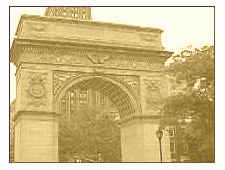|
|
|

| HOME | Synopsis | Bio | Gallery | Alt End | Links |

The Novel "Washington Square" is one of Henry James most intriguing books. It is a story is full of romance and emotion, but also deals with serious issues of loyalty, faith, and pain. The story is set in the Washington Square section of Manhattan, circa 1850, and explores the relationship between money, love, cruelty, and most importantly, the ambiguity of strong emotions. The central character is Catherine Sloper, a young woman lacking experience, classical beauty and social graces. She lives in painful conflict with her cold-hearted father, who reminds her at every opportunity of her shortcomings. Through childhood and adolescence, Catherine has repeatedly tried to please her father, but it appears hopeless. Frustrated by her lack of charm, Catherine's father levels exceptional mental abuse on her. It is clear that Dr. Sloper resents his daughter; his wife died while giving birth to her. He tells her: "How obscene that your mother should give her life so that you can inhabit space on this earth." Athough the young girl has dedicated her life to her father, one day she meets Morris Townsend, a good-looking, but vacuous young man who is unemployed. The doctor is persuaded that Morris is flirting with his daughter with the intent to take advantage of the Sloper's fortune. But Catherine has fallen deeply in love with Morris. The young man seems sincere, but he is also inept and effete. He has no profession or talent, is a poor conversationalist, and has no ambition whatsoever. To Dr. Sloper, it seems obvious that Morris is interested in Catherine because of the large fortune that accompanies her. This, in fact, may very well be an accurate assessment of the situation, although Henry James cleverly leaves enough ambiguity in the story so the reader, like Catherine herself, cannot quite confirm the true intentions of Morris. In fact, Catherine seems to suspect Morris's agenda, but if money is what it takes for her to have some joy and companionship in life, so what? Is it any wonder young Catherine lacks self-confidence? The reader can empathize with her excitement about a handsome young man who finally courts her. Like Catherine, the reader yearns for Morris to actually love and care for Catherine, and hopes that the young man is not simply after her money. As Catherine has moved closer to adulthood, she has begun to try to take charge of her life, despite her father's steadfast objections. She begins to rebel against her father. But this is futile. Her father completely dominates her. He separates the two lovers by sailing to Europe with Catherine for a year, assuming that Morris will quickly move on. The Doctor's plan backfires. Morris has waited for Catherine's return in the company of Lavinia Penniman, The Doctor's sister. In a brilliant stroke of ambiguity, which frames the entire novel, James leaves it to the reader to determine if Morris awaits Catherine's return out of true love, or simply because he is enjoying the ample hospitality of Catherine's Aunt Penniman. Upon Catherine's return, she struggles to end the domination of her her father once and for all. She decides to marry Morris without her father's consent. Her cruel father intends to disinherit her, showing total abandonment of any love for his daughter. "If she doesn't let go," he decrees, "she will be shaken off — sent tumbling into the dust! That's a nice position for my daughter. She can't see that if you are going to be pushed you had better jump. And then she will complain of her bruises..." In the final ambiguity of the book, When Morris learns that Catherine will be disowned if she marries him, he abruptly leaves her. Catherine is plunged into despair, and over the long years that follow, abject apathy. Masterfully, James presents two separate possibilities for Morris abandoning Catherine: Does Morris lose interest in Catherine once he learns she will be penniless? Or does he understand that, given his total lack of ambition, he will never be able to care for Catherine on his own? The reader cannot tell. Morris is either a heartless cad, only after Catherine's money, or is truly in love with Catherine, and willing to sacrifice his own happiness for her comfort. Like many Jamesian novels, Washington Square is a story of a young woman who is abused by conditions of money and love. Ultimately, Washington Square is a portrait of an emotionally abused woman coming of age, and being crushed by forces she is not prepared to meet. The story poses a question about people's intentions, and whether we can ever know the motives of another person. See also: Reader's Guide...
HOME - Synopsis - Biography - Gallery - Alt Ending - Links Setting - Contents - Concordance - Download - Guest Book Copyright (c) 2005, CC Charles. All rights reserved.
|
